I've been using Eclipselink in my project for a long time, but today I came across a problem, and I can not solve it.
The problem is this: at first I search my "Function" object in an instance of my program, after that in another instance I search and change that same record (changed the "Interval" and "Date" column) and saved. After this in the first instance I change only the "Interval", but in the database the "Date" field has been changed even if I have not changed, Eclipselink (in the first instance) generates in the UPDATE the change of the field "Date" only because the "Function" of the first instance is outdated with the database, whereas changes were made to the registry in the meantime, between searching the object and saving it.
When analyzing the querys generated in the database i noticed that Eclipselink generates a SELECT before each UPDATE, but in my case i would not need it, how can I make Eclipselink only add in the UPDATE the fields that had changes? And not those that differ from the database.
My Eclipselink configuration:
"javax.persistence.jdbc.driver", "com.mysql.cj.jdbc.Driver"
"javax.persistence.jdbc.url", "jdbc:mysql://{IP}:3306/{USER}?useTimezone=true&serverTimezone=America/Sao_Paulo&autoReconnect=true&zeroDateTimeBehavior=convertToNull"
"javax.persistence.jdbc.user", user
"javax.persistence.jdbc.password", password
"eclipselink.cache.shared.default", "false"
"eclipselink.logging.level", "WARNING"
"eclipselink.query-results-cache", "false"
"eclipselink.refresh", "true"
"eclipselink.weaving", "static"
"connection.autoReconnectForPools", "true"
"connection.autoReconnect", "true"
Code:
Function function = FunctionDAO.getFunctionByName("A");
function.setInterval(0);
...
EntityManager manager = {config};
manager.getTransaction().begin();
manager.merge(function);
manager.getTransaction().commit();
manager.close();
import java.io.Serializable;
import java.util.Date;
import javax.persistence.Column;
import javax.persistence.Entity;
import javax.persistence.Id;
import javax.persistence.Table;
import javax.persistence.Temporal;
import javax.persistence.TemporalType;
@Entity
@Table(name = "function")
public class Function extends ModelAudit implements Serializable {
private static final long serialVersionUID = 1L;
@Id
@Column(name = "name")
private String name;
@Column(name = "interval")
private Integer interval;
@Temporal(TemporalType.TIMESTAMP)
@Column(name = "date")
private Date date;
...
getters and setters
